
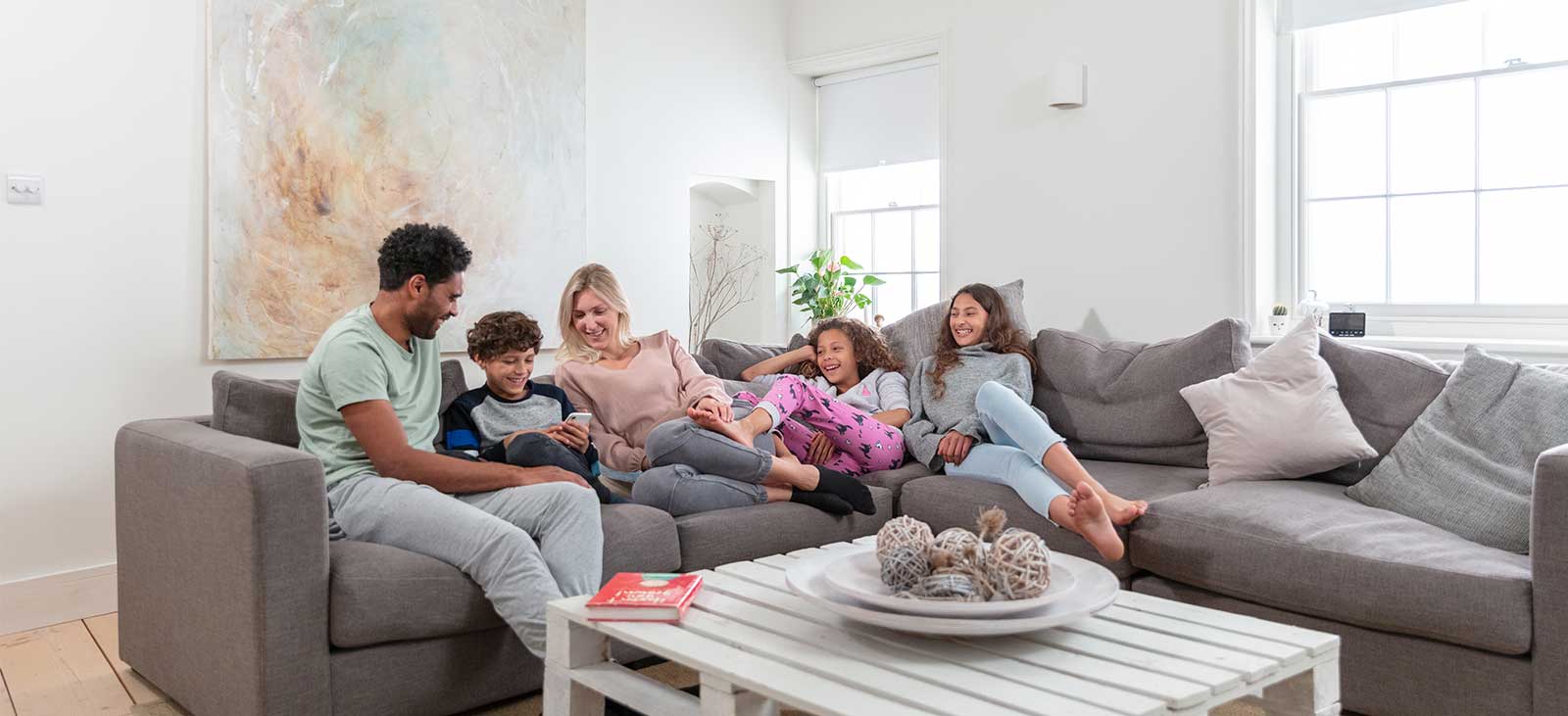
What it means to be eco-friendly


10 ways to be more sustainable
If we all take steps to reduce our impact on the environment, the world would be a much healthier place. Being eco-friendly means living in a way that’s not harmful to the environment and trying to leave the world in a better, or at least no worse, place than you found it.
It’s easy to take steps to be more sustainable in different areas of your life, including at home, at work and when travelling; from recycling more and avoiding single use plastic to bigger changes like investing in solar panels or an electric vehicle (EV).
But with so many different ways to be sustainable, how do you achieve your goals? Here are 10 simple steps to help you have a more sustainable lifestyle.
How to be more eco-friendly at home
1. Choose cleaner sources of energy
Some energy suppliers offer cleaner energy supply options. For instance, all our customers’ homes are supplied with 100% renewable electricity as standard1 and at no extra cost.
Alternatively, solar panels allow you to generate your own renewable electricity using the power of the sun, and you can even install a solar battery to store the electricity you generate until you need it, at night for example.
We also offer sustainable heating solutions for your home, such as energy efficient boilers and air source heat pumps. An air source heat pump is a renewable energy system that uses the energy from the outside air to provide your home with heating and hot water.
What’s more, an air source heat pump benefits from being a more environmentally friendly alternative to traditional gas or oil heating.

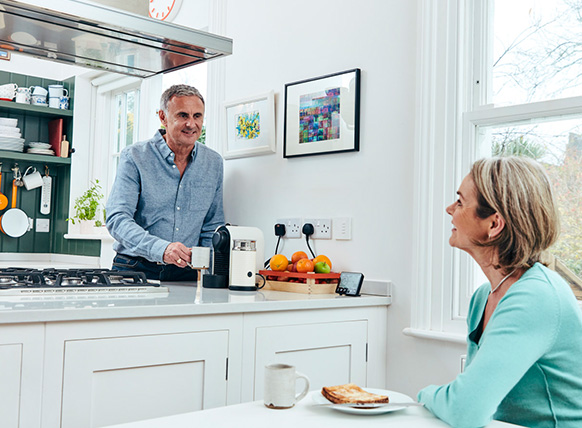
2. Save energy and switch to a smart meter
Saving energy is one of the easiest things you can do to reduce your carbon footprint. Never leave your appliances on standby needlessly – instead hit the off switch and you can make savings as well as being more sustainable at home.
It’s estimated that UK homes could save around £35 a year on electricity by stopping leaving appliances in standby mode2. So by switching devices such as computers, ovens and TVs off at the mains, you could save money and lower your energy use.
A smart meter tracks your energy use and automatically submits your meter readings to your energy supplier for you. Smart meters come with an in-home display which tells you how much energy you’re using at any one time and how much it costs. You can use this information to help you to understand how you use your energy around the home, which in turn will help you to save both energy and money.
3. Cut down on plastic packaging and opt for eco-friendly alternatives
With the growing number of food refill shops across the UK, it’s easier to buy products with less packaging than you may think. Simply take your own reusable containers to a refill shop and fill them with staples such as rice and pasta, or fruit and veg. Some supermarkets are also trialling refill schemes too.
And it’s not just in the kitchen you can cut down on plastic packaging. A bar of soap cleans just as well as a bottle of shower gel and usually has little or no packaging. You can get shampoo and conditioner in soap-bar format too. Switch your soap dispensers to bars and you’ll reduce your plastic waste even further.
4. Recycle more and reuse where you can
Make sure you know what can and can’t be recycled and look at other ways you can recycle your household waste, for example look at whether you can reuse the items in a different way around your home.
Cling film and foil are handy for wrapping sandwiches and covering leftover food, but they’re off to landfill after one use. Opt instead for reusable beeswax wraps and pop sandwiches into reusable containers made from bamboo or eco-plastic alternatives.
Also, don’t forget to recycle your uncooked food waste, such as fruit and vegetable peelings, by putting it in a compost bin, your garden will need the compost when it comes to spring planting time.

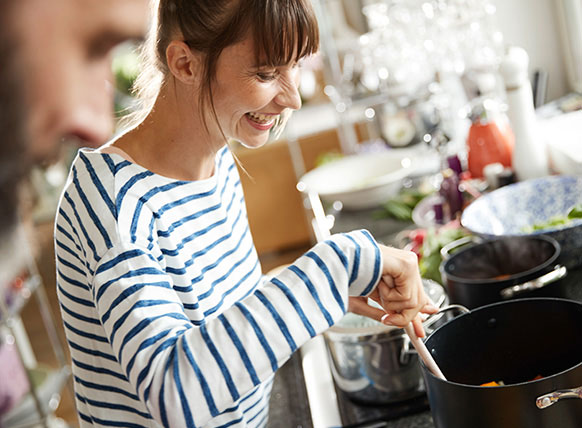
5. Consider changing your diet
Vegans and vegetarians have a lower carbon footprint than anyone else3. But you don’t have to cut out meat, fish and dairy altogether to make a difference. For example, you could reduce your meat and fish consumption from three to four times a week to once or twice and aim to have one or two dairy-free days too.
How to be more eco-friendly at work

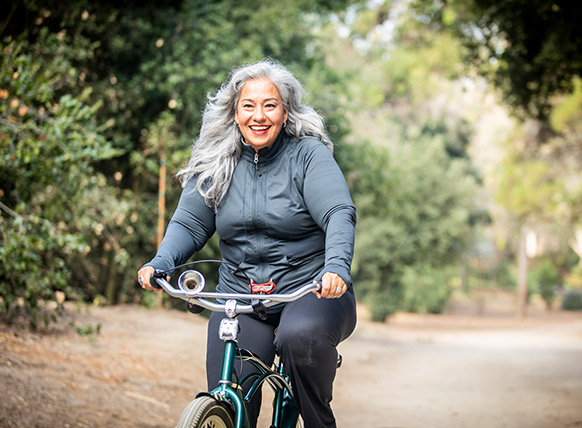
1. Mix up your commute
Avoid jumping in your car for shorter journeys and try walking or cycling to your destination instead. The short walk will not only boost your fitness, but it’ll also reduce your carbon footprint too. If you’re traveling a further distance, consider public transport or investing in an electric vehicle.
2. Watch your energy consumption
In the same way that you’re mindful of your energy use at home, consider if you’re wasting energy whilst at work too. Make sure to turn off any appliances such as computer screens at the end of the day and switch lights off when they’re not being used.
And don’t forget to recycle what you can rather than just throwing it away. Even better, reduce your waste completely by taking your own refillable water bottle and bringing your lunch in an eco-friendly reusable container, rather than buying something in single-use packaging.
How to travel more sustainably

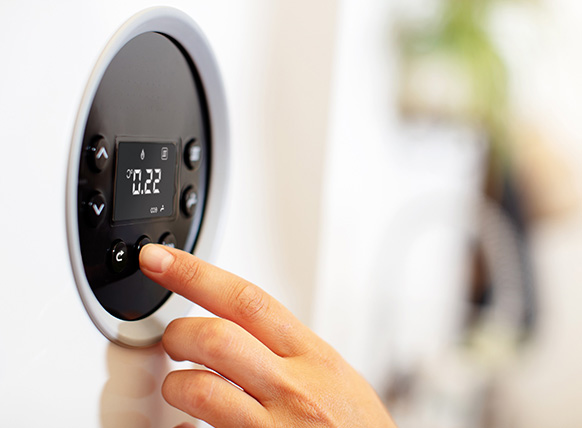
1. Unplug devices
If you’re going away on holiday, it’s important to switch off your home before you leave. Don’t forget to switch off and unplug your appliances if possible and set your boiler to eco mode to save energy.
2. Research your travel arrangements
How and where you choose to travel has a big effect on the environment. Air travel is the most environmentally damaging method of transport4 so instead of flying to a faraway destination, consider a staycation in the UK and choose lower carbon travel such as public transport, cycling, or driving an electric vehicle.


3. Make green choices
When travelling you should continue to make green choices. For example, choose environmentally friendly products, like recyclable water bottles or reusable shampoo containers and be mindful of polluting activities such as littering.
Living an eco-friendlier life is simple once you know where to start and if you want more sustainable tips, check out some of our other blogs:
1. Electricity backed by 100% renewable sources. Electricity sourced from E.ON's renewable assets, agreements with independent UK generators and the purchase of renewable electricity certificates. The electricity supplied to your home comes from the National Grid. Find out more at eonenergy.com/renewable
2. Energy Saving Trust: Quick tips to save energy
3. The Guardian: Avoiding meat and dairy is ‘single biggest way’ to reduce your impact on Earth
4. BBC: Should we give up flying for the sake of the climate?


Our blog
Read our latest blogs to discover how E.ON is leading the energy transition through smart and sustainable solutions.


100% renewable electricity
We believe in a sustainable future, that's why we provide our customers' homes with electricity backed by 100% renewable sources including wind, biomass and solar, with a fixed tariff.


It's time to clear the air
Towns and cities across the UK are suffering from illegal levels of air pollution. We think it’s time to do something about it.
